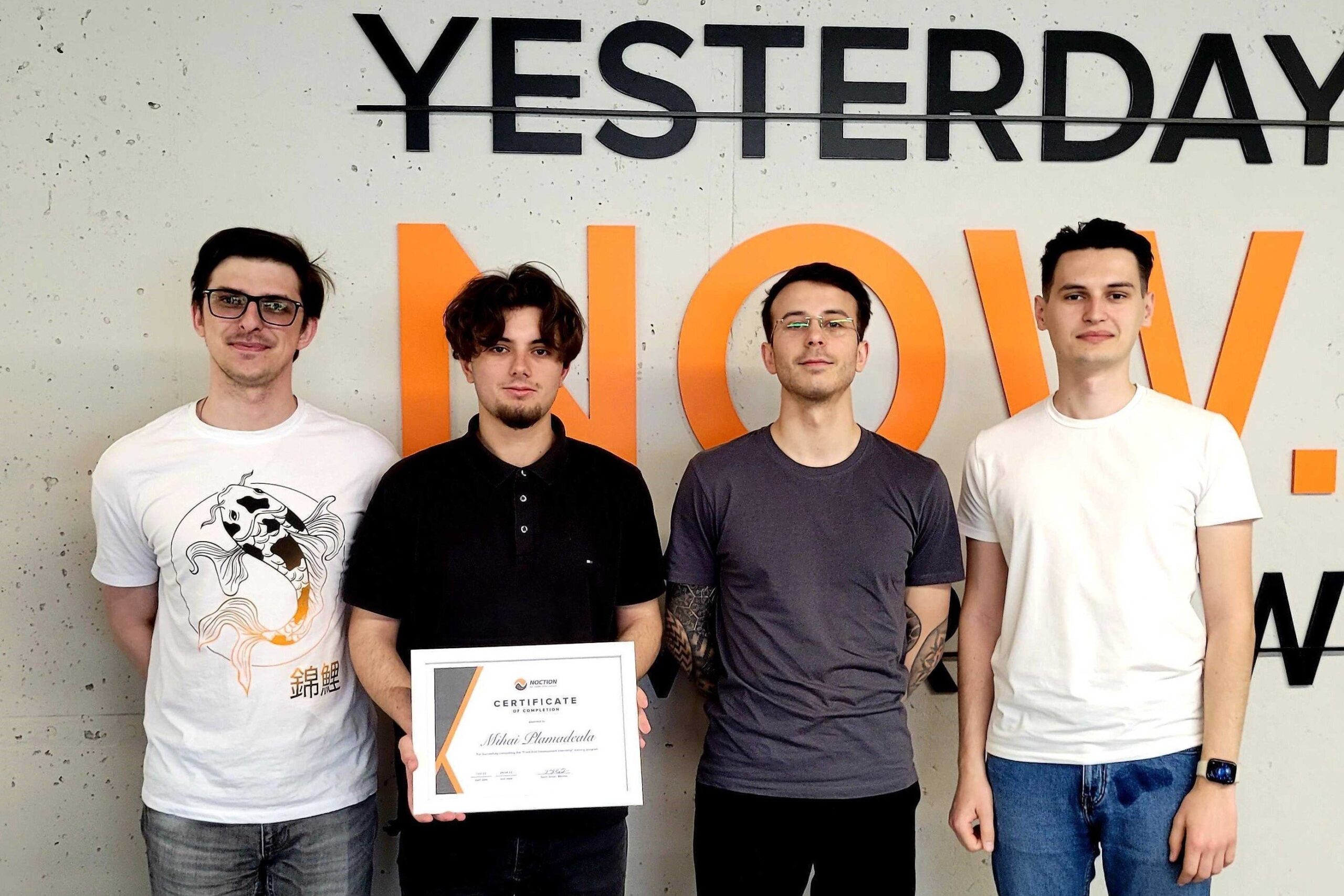Scrum is a popular Agile framework that is widely used in software development to help teams deliver high-quality products in a collaborative and efficient manner. However, despite its popularity, many people do not fully understand the principles and practices of Scrum, and therefore underestimate its capabilities.
To address this confusion, we reached out to our Scrum Master, Olga Demcenco, to provide insight and answer common questions about Scrum, the role of a Scrum Master, and how the implementation of the framework principles helps to enhance the productivity of the Noction’s development teams.

Why Agile and Scrum are essential for organizations and teams looking to maximize their potential?
I strongly believe that becoming Agile and implementing Scrum should not be an end in itself. The main goal is to use the framework instruments and principles to become as successful as possible. Scrum helps us to understand where we’re now (point A), what we really want and where we want to be in the future (point B). To get from point A to point B you’ll have to improve the way you work. Understanding that you can’t get a better result without a change to the better the way you work is essential for the self-development of the team.
In my opinion, Scrum is one of the most suitable ways to become successful. And it’s not only about organizational change, it is deeper, … but first things first.
How is Scrum organized at Noction Moldova?
Noction Team adopted Scrum in 2020. Although the Scrum framework has been already implemented according to the Scrum Guide, we are still in the transitional period from traditional management to mature self-organized teams.
You may ask why it takes us so long ?! And here’s the answer: “Only long-term changes do really work!” 😉
“The most general lesson to be learned from the more successful changes is that the change process goes through a series of phases … that require a considerable length of time. Skipping steps creates only the illusion of speed and never produces a satisfying result” John Kotter
What are your responsibilities as a Scrum Master?
In brief, as a Scrum Master, I’m in charge of establishing Scrum according to the Scrum Guide. The full list of responsibilities can be found here.
Though, the Scrum Master’s role is bigger than just facilitating Scrum. Scrum Master acts as a change agent. And “it’s a long way to the top if you want to Rock’n’roll”
What advice would you give to someone new to the role of Scrum Master?
Albert Einstein said, “The more I learn, the more I realize how much I don’t know”. This statement can serve as a motto of the Scrum master. My advice is – always keep growing and developing, even when things get difficult, and never stop on the path of self-improvement.
Also, keep in mind three basic Scrum postulates:
1) There are no shortcuts to becoming an expert in Scrum;
2) Understanding Scrum is easy, but implementing it is hard;
3) People Are the Heart of Scrum.
How do you help our team to thrive?
I’m convinced that the best help is showing the right direction and underlying the growth points. Many Scrum Masters ( including me) are very tempted to babysit their teams and that’s a huuuge mistake.
Trying to help you often take on the “Parent” (or even the “Rescuer” )role. You might think: “So what? It’s never bad to be a caring ‘mother’ to your team! And sometimes that’s true, your support can really help and encourage! BUT every coin has two sides. And the price here is that you are preventing your team from growing up.
Being not only a Scrum master but also a mother of 3 I know for sure that the best way to help your children to thrive is to give them freedom, trust, and a chance to try on their own.
Guiding and supporting without overprotection and micromanagement is the biggest challenge and the greatest aspiration for any Scrum Master.
What tools do you use to help the team members to communicate effectively with each other?
I really like Coaching, and consider it the most effective one! I always try to be a coach partner for my team, however, sometimes my tendency to be a “Mother Hen” takes over. But I’m working on this.
We also use Retrospective events – the best for questions, feedback, and reflection. Actually, there is plenty of useful techniques, i.e. GROW model, the Fishbone tool for Root Cause Analysis, and Lencioni’s model. You can easily find one which suits your goals.
What do you think are the challenges of using Scrum?
I am a firm believer that there is one and the most significant challenge – to help your team reach maturity.
To enjoy the magic of Scrum to the fullest you should set everything up properly. At first, you might think it’s quite easy. Yes, you can start using various Scrum rules and tools like organizing events, sorting out the backlog, starting the sprint, etc. But this is only the tip of the Scrum Iceberg, and the main challenge is hidden under the water.
People are the heart of Scrum. And they are complex and unique. Each one has their own character, desires, needs, view on the problem, personal goals, ambitions, expectations, leadership qualities, values, etc. Members of the team can differ dramatically from person to person, and the main challenge of Scrum is to make them all work together as an organism: interact, listen, and hear each other for achieving a common goal. After you pass this challenge, you’ll enjoy the tremendous power of the strong mature team, in active and deep listening, in trusting relationships, and, of course, in the scrum values.
What do you think are the most important skills for a Scrum Master?
I’d like to underline the 2 of them:
- By understanding yourself, you can understand others. So the first one is self-reflection. And don’t forget to boost your EQ.
- Be a partner for your team. You can inspire the team members to maximize their personal and professional potential and to develop as a team only by being on an equal footing with them.
In my journey as a Scrum Master, figuring out better ways to truly be helpful is one of my biggest opportunities for growth. I found that growing my range with coaching skills and facilitation skills is where I am able to create the most impact.
What Scrum elements are often unattended in practice?
Scrum Guide declares that “each element of the framework serves a specific purpose that is essential to the overall value and results realized with Scrum”. A deep understanding of this sentence came to me only with experience. Let me illustrate this with my example.
Starting my career in Scrum, I was thinking that events and artifacts played the main role. And such things as scrum values were simply filled in with beauty. Oh, and how wrong I was! So do not repeat my mistake. If we take the Iceberg metaphor mentioned above, I would say that scrum values represent its deepest layer, it’s kind of a basis for building Scrum.
And if you wake me up in the middle of the night asking which team has more chance to be successful in the near future, the one who has all the events and artifacts, or the other one only committed to scrum values, I’d definitely say – the second one. Trust me, as soon as the team adopts scrum values, a lot of existing issues in your team will be resolved.




